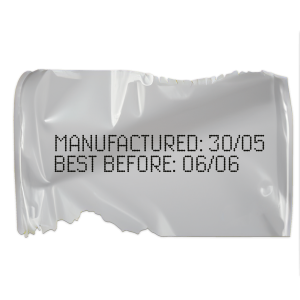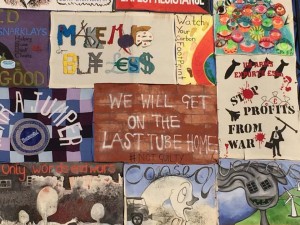
M&S Mojitos and the Future of Politics
by Christian Edwards | May 9, 2019
An attempt to gloss over the rape allegations levelled against Julian Assange should have been enough bad press for Diane Abbott in April. It wasn’t, and on a Thursday afternoon she was caught drinking a premixed Marks and Spencer mojito on an overground tube to Stratford. Cue the usual outrage from the usual sources: The Sun and The Express were quick to point out that this is illegal (and that she wasn’t only drinking a mojito, but slurping it!), and The Telegraph reminded readers that this woman had previously campaigned to end the sale of cheap alcohol (a slurper and a hypocrite!). Cue, also, the usual mock praise from Twitter whenever a politician does something a bit naughty: Abbott is now a national hero; ‘the establishment’ have scored an own-goal by criticising her for doing as the rest of London does; and at 1pm on the 18th April every year we should all pause to commemorate the moment by also cracking open an M&S mojito on a train.
This article is not about Diane Abbott. Of course politicians shouldn’t break the law, but they always seem more human when they do. For the last few weeks Parliament has been very grim and the sky very grey; I can’t help but feel slightly sympathetic towards Abbott having a drink before a bank holiday when the sun came out. Any calls for her to resign are of course absurd. She has apologised and we should forget about it. Maybe I should care more but frankly I don’t, and I’ve been quite touched by the national show of solidarity which has left plenty of M&S shelves without mojitos.
Neither is this article about the person who took the photo. ‘I do not believe the person who saw Diane Abbott drink a tin on the train and decided to rat on her has ever had sex even once in their life and you will not change my mind on this,’ tweeted the as always hilarious Guardian journalist Marie Le Conte. Yes, an uncool thing to do. The snitch must be ‘an absolute dweeb’ according to Mollie Goodfellow. But I reckon there are more dweebs out there than we would like to admit. I reckon we’d all be a bit dweeby in the same situation. If I’m on a tube to Islington and I see Jeremy Corbyn drinking a Stella, I’m pretty sure I’d take a photo. Not to ‘rat on him’, not to go to the police – maybe just to put on a group chat. ‘Lol, rough week Jezza?’ I’m probably more dweeby than I’d like to imagine, and I applaud everyone on the tube carriage who wouldn’t do the same. But there is just something funny about seeing politicians doing normal things.
So this article is not about Diane or the dweeb; it’s about how we’re all going to have to live with our online pasts, and how this might impact our futures.
Consider another situation. Sometime in the not-too-distant future, you see a news story about a politician doing something else illegal on a train. Someone has released a video of a young man or woman with a group of friends in an empty carriage lifting a key to their nose and snorting something off it. Terrible. Unforgivable. A sackable offence. A mojito is one thing but hardcore drugs are another. But consider now that the footage of this politician is from fifteen years ago – from a time before the politician was a politician. They are merely a teenager with a group of friends doing something illegal, and caught doing it. Perhaps it wasn’t until ten years after this night that they started their career in politics. But this video has resurfaced and now they are out of a job.
What are we to make of something like this? The simple answer is that we don’t yet know. The generation who have grown up recording their lives on their phones have not yet quite entered the political age. But when they do we may well see stories like this cropping up all the time, and it’s hard to say how we might react: will we forgive the politician because of their age, or will these indiscretions permanently taint their reputation? I think these are the sort of questions we will be asking a lot in the very near future. As the increasing ubiquity of technology makes it harder and harder to forget our pasts and disown our misdemeanours, I think the news will be increasingly full of situations like this. In fact I think it’s affecting us now, but we cannot yet quite see it. Since I came to Oxford, I’ve been surprised by how few people talk seriously about having a career in politics. Maybe the current state of the nation has painted politics as too unsexy and thankless a task to tempt any young person into it. Bad pay, bad hours, bad people; there are hundreds of reasons why young people who have paid even the slightest attention to Parliament in the last couple of years would want to steer clear of politics. But I suspect there are deeper, more personal reasons than these; bad press may be playing or about to play a bigger role than ever. Our generation has been the first to grow up with the internet. It has been by our bedsides and in our pockets for most of our lives and we have told it a lot about ourselves. I think there’s an implicit fear among young people that there is simply too much ‘dirt’ on them. And this dirt is ‘out there’, wherever that is. Who knows which ‘friend’ has a video of them so drunk they can hardly stand, or screenshots of a particularly unpleasant Facebook message – and who knows which ‘friend’ will take a small sum from a tabloid to release some of this ‘dirt’? A dweeby one of course.
We are the first generation to experience this. If someone today, drunk, in the type of groups that still do these things, was to put their penis into a dead pig’s mouth, you can be sure that someone in the drunken group would think it a good idea to get their phone out and film it. And if such a film existed, you can be pretty sure that the person who put their penis into a dead pig’s mouth might want to avoid a job that took such an avid interest in personal history that the video of that person putting their penis into a dead pig’s mouth would eventually be found and made public. This night wouldn’t just be recorded in the pages of a book, where anything can be written and where deniability is still possible. It would be recorded in all its graphic filth, and if such a thing occurred there would be no denying and no forgetting. Of course I am not making a defence of young people indulging in bestiality or necrophilia. I’m just saying that I’m unsure if that person would still have become Prime Minister.
To find out just how much I had told the internet I recently started a free trial at ‘brandyourself.com’, a startup which helps you clear up your social media and ‘build a winning online reputation’. (They appeared on Dragons’ Den last year and received an offer from all five dragons. In the end they accepted £100,000 from Peter Jones for just 2.5% of their business. ‘It’s a concern, as a dad with kids, that one photograph or one annoying thing – that their behaviour could affect their career’. Indeed, Peter.) So I gave the website my details, it scanned every social media account of mine it could find and flagged up 153 posts which it says are damaging my online reputation. Ah. It was only a free trial, so it wouldn’t show me all of these posts (that luxury will cost you $99 a year). But one post wasn’t blurred out. It was a Facebook post from March 2011. I was twelve years old, and it must have been one of my first posts on Facebook.
Chris Edwards:
is going to fucking kill Sam, who took the oars away from me and Robbie who were on a boat in the middle of a freezing lake and pushed us into the middle of it where we were stuck for one fucking hour.
So, it turns out when I was twelve I publicly threatened to kill someone. Whatever algorithm brandyourself.com uses it’s identified me as potentially criminal and certainly unemployable (my online reputation scores ‘very poor’ and the website keeps flashing angry red lights at me). In reality the issue was very minor: Sam, a friend of mine lives in a village and has a small lake at the bottom of his garden; Robbie and I got into an old plastic boat he had, and were waiting for Sam to get in too before he took the oars and pushed the boat into the lake; it was too cold to swim, so Robbie and I drifted about for a bit and then ended up by a bank where we got out and were a bit angry with Sam. All very harmless. (In fact, while writing this I found Sam’s old Facebook post, which said all that I just said and ended with ‘After that Robbie chased me round the lake and threatened to kill me…in a friendly sort of way. Then we went to play GTA 4 and I now owe them both 4 life.’ Harmless.)
But of course the algorithm didn’t know it was harmless, and if companies use similarly unsophisticated algorithms maybe that’s why I’ll still be getting rejected for internships well into my twenties. At least now there are only 152 other posts that are damaging my online reputation. Most of these I assume I will be able to explain away like I just did, but some of these I assume will be quite awful and make me cringe to remember. But that’s even if I remember them. And that’s the thing. There are plenty of messages we have sent that we do not remember sending and certainly no longer endorse, but they are still ‘out there’. Part of the fear is not knowing what you said, but being sure you said something to someone somewhere somehow on some platform. And rather than finding out, I think many people will choose to simply ‘not walk i’th’ sun’.
This is of course not all bad. The digital world has been a phenomenally effective way of finding out ‘who people really are’, or at least remembering who they were. If someone in power has said racist or homophobic things, it’s reasonable that we’d want to know about these things. As I write, only yesterday was an MEP candidate for the pro-Remain party Change UK deselected for a tweet from a couple of years ago in which he said he would consider supporting Brexit if it stopped ‘Romanian pickpockets’ coming into Britain. Thanks to Twitter, people were able to find out what he had once said and act on their findings. And similarly, Twitter allowed us to see that Toby Young said some quite awful things and we were able to decide if we wanted him to be on the board for university regulations. In the past this may not have been possible.
But there is a difference with these examples. When Toby Young thought it fine to tweet about the ‘serious cleavage’ behind Ed Miliband at PMQs (one of about ten ‘boobs’ tweets) and to describe working class students at Oxford as ‘universally unattractive’, he was in his forties. This isn’t to say that people can never change, but people really should have changed by forty. Is the situation different with a younger person? Did they not know any better? Should we ignore tweets or Facebook messages from before the age of eighteen, when the child ‘didn’t know any better’? I’m not sure, but with all this new information about people it makes sense that we’re going to need to reassess how we judge these things.
The Abbott situation has received the warm praise it has because it occupies a sort of legal grey area. If she had waited five minutes and opened her drink when she had got off the train, she would not have been committing a crime. We think, for this reason, that she should be let off. Yes, it’s a crime, but it’s a very small one. She’s just an adult woman having a drink, admittedly on a train, but then I’m sure politicians leave their cars on double yellows or push the speed limit from time to time. For whatever reason, we think that these crimes don’t really count. But the situation with the hypothetical young politician is more black and white. Even if the person had waited five minutes before they got off the train to have their coke it would still be a crime. Sales of cocaine will not rocket like the sales of M&S mojitos in a show of solidarity with the politician caught in the act. But if drinking on a train occupies a legal grey area, maybe committing a crime when you’re young occupies a moral grey area. If the politician was seventeen when they were caught, does this change our opinion of the incident? Is this person still unfit for office? Is it impossible that they have changed?
In an increasingly digitised world, not only is the space between the public and the private collapsing – the space between the past and the present is collapsing too. It is harder to forget things than ever before, and harder to say that we have changed when evidence of who we once were is still ‘out there’. I worry that people will choose to live a quieter, less noticeable and scrutable life rather than risk being exposed, and I worry that this will make good people who once did bad things choose to stay away from politics. And there are plenty of reasons why we might want these people in politics. The only people who are the same at sixteen as they are at sixty are saints (or a minority of vicar’s daughters, and I’m not sure how many more of them we want). As the generation who have grown up with smartphones enter their working age, we will see if my fears have any substance. Maybe the rows and rows of untouched piña coladas and pornstar martinis are a cause for optimism. People make mistakes, and it will be harder for all of us to forget them in future. And if our mistakes can’t be forgotten, maybe more will have to be forgiven. I hope this is what the empty shelves of M&S Mojitos are telling us. ∎
Words by Christian Edwards. All opinions are writer’s own. Artwork by Kathleen Quaintance.




